| |
|
|
|
|
This is my favourite part
of the City, I think. Here we are, barely ten
minutes walk from St Paul's. You've left the
corporate monoliths and the multi-nationals
behind. The Barbican and London Wall are close
by, but they are out of sight to the east, and
you can ignore them. Instead, you wander up into
the entirely unexpected intimacy of Little
Britain and Cloth Fair, the charming houses still
largely residential. If I was the kind of person
who did the Euromillions lottery, and I won, you
can jolly well bet I'd be buying one of them.
Betjeman lived here for a while before the charms
of the English upper classes (or at least one
member of them) side-tracked him to Chelsea.
And then the road opens out into the provincial
domesticity of Smithfield, with central London's
last wholesale provisions market on one side, and
St Barts hospital on the other, the
dressing-gowned inmates looking down from the
long balconies.
Smithfield is poised keenly on the edge of
Holborn and Finsbury, but it is still as much a
part of the City as the Lloyds Building or the
Bank of England. International money cannot allow
places like this to survive of course, not so
close to the more obscene markets of Bishopsgate
and Leadenhall Street, so Smithfield Market will
soon go the way of Billingsgate and Covent
Garden. The hospital will survive it seems, at
least for now, a wilful snook-cocking to those
who judge the meaning and imagination of a place
by the price of a square metre of its territory.
And just beside the hospital is the entrance to
St Bartholomew the Great, looking a little like
an Oxbridge gatehouse set among the tall
terraces.
And just as this is my favourite part of the
City, so St Bartholomew the Great is also my
favourite City Church. It is also the biggest
church in the City, but it was once one of the
biggest churches in England. Incredibly, what we
have here is merely the choir and lady chapel of
what was once a vast Augustinian Priory church,
the nave extending westwards over much of the
ground described already in this article.
The foundation was in 1123, and the hospital was
a part of it. The church was 280 feet long, a
little more than half the length of the original
St Paul's Cathedral. In the pious years of the
early 14th Century a long lady chapel was added
to the end of the apsed chancel. Cloisters were
added in the 15th Century. Come the Reformation,
the parishioners were allowed to buy the chancel
from the new owners into whose well-feathered
laps it had fallen, and the nave was demolished -
all except, intriguingly, the western doorway
into the south aisle of the nave, which survives
as part of the current gatehouse. The lady chapel
was sold off for use as housing and workshops,
one of the chancel aisles became a school, and so
on. A tower was added in the early 17th Century
to the new west wall of the former chancel. The
church was too far north for the Great Fire to
affect it.
The 19th Restoration took place in several waves,
The last and most important by Sir Aston Webb who
was working here until the 1920s. Simon Bradley
in the revised Pevsner notes the archaeological
nature of Webb's restoration, so it is always
easy to distinguish restored elements from the
original - as he observes, it is an
intelligent honest solution, though not always an
immediately appealing one. The lady chapel
was brought back into use, the chancel aisles
cleared. St Bartholomew the Great survived the
Blitz pretty much intact.
No City church has the wow factor on entering as
much as St Barts does. Indeed, few churches in
England do, especially on a winter afternoon. As
the cliche goes, the years roll away. The layered
Norman arches, tier on tier, unfold before you
towards the east. An oriel window peeps bizarrely
into the church from the south triforium. It is
all of a piece, and yet somehow so much more than
a piece. If you are lucky enough to hear the
choir rehearsing, especially if it is something
old and English, you will be transported. Around
the chancel aisles are post-Reformation memorials
to the Great and Good, but nothing intrudes, for
it would be hard for anything to intrude here in
this wholly majestic and serious space. To the
east is the lady chapel, simpler, full of light
and colour. What survives of the cloisters is now
home to a rather good café.
St Barts is one of just two City of London
churches you have to pay to get into, which in
some ways is a shame as I used to enjoy just
popping in for a few minutes while on my way from
somewhere to somewhere else. But admittance is
only four pounds, less than the price of a pint
in this part of London and easily better value in
terms of refreshment and intoxication. If you
want to take photographs you'll need to pay an
extra pound - think of it as a take-out. |
|
|
|
|
|
|
|
|
|
|
|
|
|
Simon Knott,
December 2015
location: West Smithfield EC1A 7JQ - 1/012
status: parish church
access: open seven days a week. 8.30am-5pm
Monday to Friday, 10am to 4pm Saturday, 8.30am to 8pm
Sunday. Admission £4, photography permit £1.
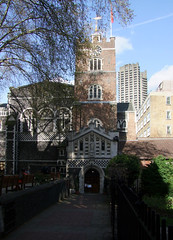 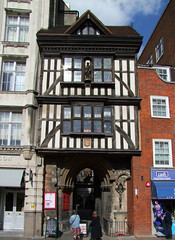 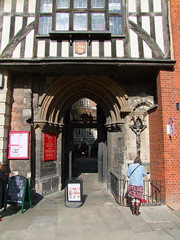 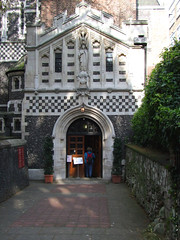 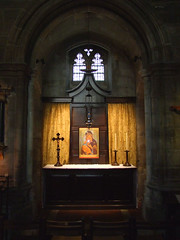 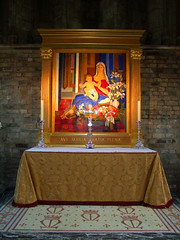 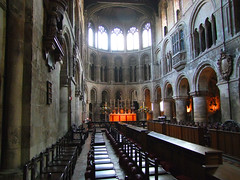 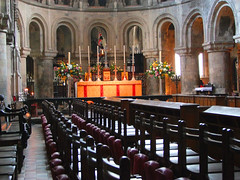 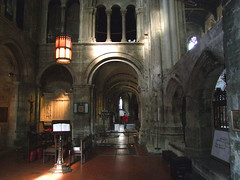 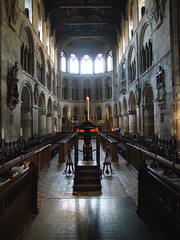 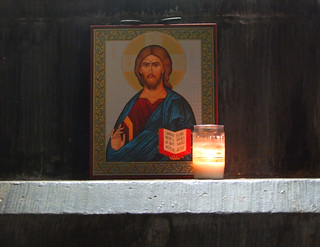 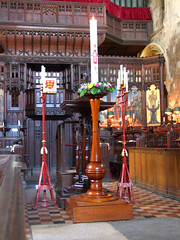 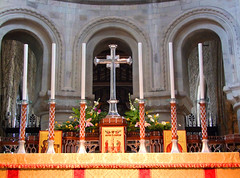 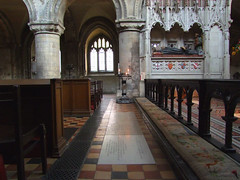 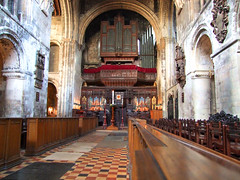 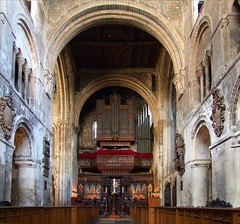 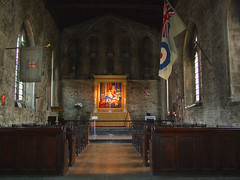 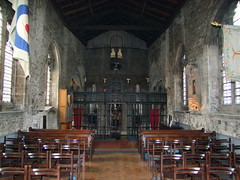
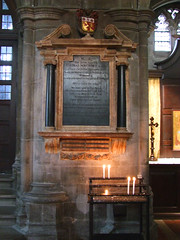 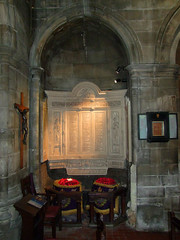 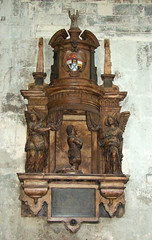 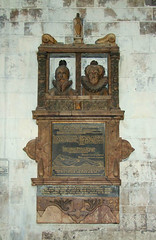 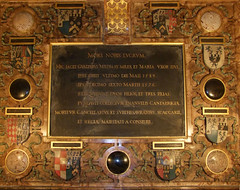 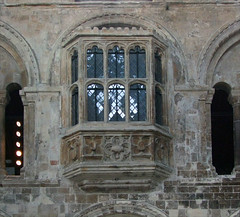 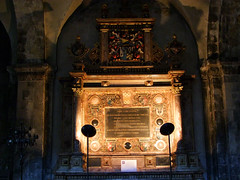 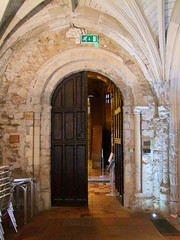 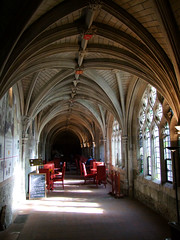 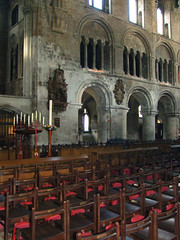 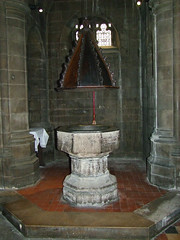 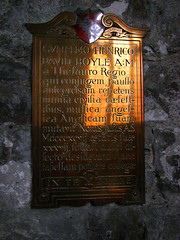 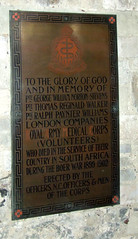 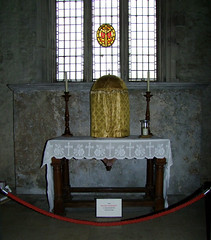 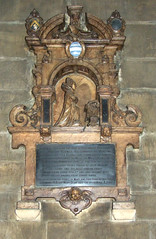 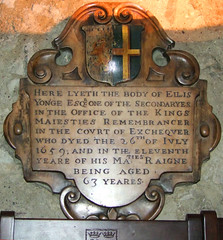 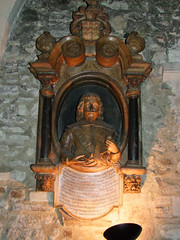  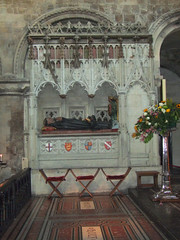
Commission
from Amazon.co.uk supports the running of this site
|
|
|
|
|
|
